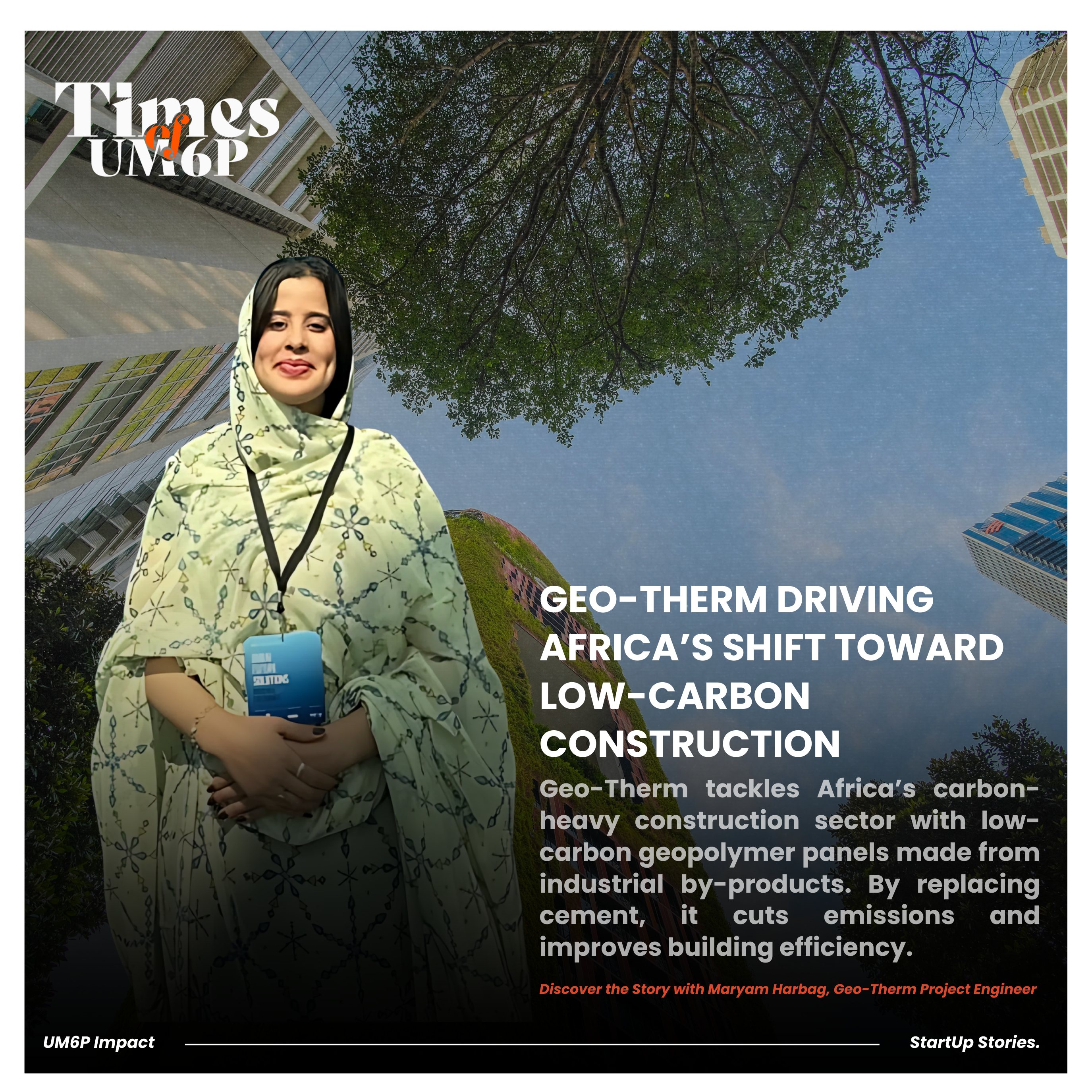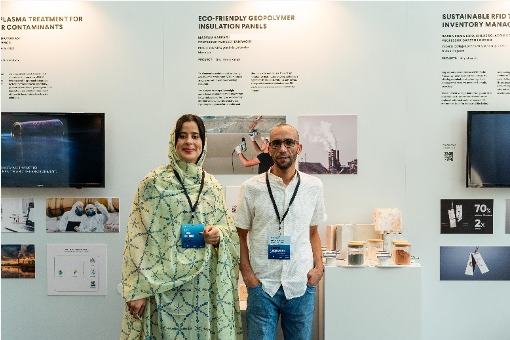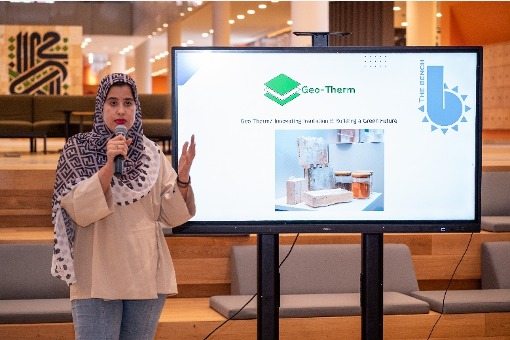Geo-Therm: Reinventing Building Materials for a Sustainable Future
UM6P Impact | StartUp Stories #02

The construction sector stands today at the heart of the climate challenge. Buildings alone are responsible for nearly 40% of global CO₂ emissions, driven by the massive use of Portland cement, high energy consumption during construction, and poor insulation performance. With rapid urbanization, growing housing demands, and increasing climate pressures, there is an urgent call for solutions that can redefine the way we build and live. In this context, Geo-Therm emerges as a pioneering Moroccan startup that is reimagining construction through sustainable innovation. The venture is developing eco-friendly prefabricated insulation panels based on geopolymer technology, a breakthrough material science that transforms industrial and mining by-products into high-performance, low-carbon alternatives. These panels are not just another construction product, they are designed to drastically reduce carbon emissions, enhance thermal comfort, and lower energy bills for households and businesses.At the same time, they offer durability, fire resistance, and cost efficiency, making them a viable and scalable substitute to conventional cement-based materials.
But Geo-Therm is more than technology. It is the story of how scientific research, entrepreneurial ambition, and sustainable values can converge to create real-world impact. Rooted in UM6P’s innovation ecosystem, the project exemplifies the university’s mission: to transform cutting-edge research into solutions that address Africa’s most pressing challenges while inspiring global change.
In recognition of its innovative approach, Geo-Therm was selected as the only Moroccan project, with UM6P as the only Moroccan university, to participate in the prestigious Prototypes for Humanity 2024 exhibition in Dubai, a global stage celebrating breakthrough technologies with real-world impact.
Toward Tomorrow
The story of Geo-Therm began in February 2024 within the MSN Department (Materials Science and Nanoengineering) of UM6P, where the Sustainable Materials and Recycling Tribe, led by Professor Youssef Tamraoui, embarked on a shared mission: to reimagine construction through sustainability. At the heart of this journey is Maryam Harbag, who serves as the project engineer driving the development of Geo-Therm. With her expertise in eco-materials and energy efficiency, she has been central to transforming the project from an academic idea into a tangible innovation. The team, fueled by the belief that “working together makes the impossible possible,” combines complementary skills—from material science to energy systems—to tackle one of the world’s most pressing challenges: decarbonizing the construction industry.
Two critical issues shaped their vision :
Cement dependency: Cement production is responsible for nearly 8% of global CO₂ emissions, making it one of the most polluting industries.
Poor insulation in existing housing: Across Morocco and Africa, many buildings lack proper insulation, leading to high energy bills, thermal discomfort, and unsustainable cooling/heating practices.
Motivated by these challenges, the team envisioned low-carbon, high-performance insulation panels that could replace conventional cement-based materials while radically improving energy efficiency in buildings.
By valorizing industrial and mining by-products such as fly ash, metakaolin, demolition waste, and phosphate waste rock, they created their first geopolymer-based formulations a breakthrough merging sustainability with technical excellence.
What began as a research initiative under the Bench Program, funded by the Energy Sustainability Chair, has since evolved into a promising startup project with national, regional, and international visibility. Geo-Therm represents not just an innovation, but a testament to visionary leadership, engineering dedication, and collaborative ambition.
Implementation
Since its inception, Geo-Therm has moved steadily from concept to tangible innovation through a series of well-defined milestones. The team began with rigorous material characterization, analyzing the chemical and physical behavior of geopolymer mixtures to establish a foundation for performance optimization. Multiple formulations were developed, aiming to strike the right balance between thermal insulation efficiency and mechanical strength.
By mid-2024, these efforts led to the successful design and laboratory-scale fabrication of the first three panel models, each tailored to explore different structural and thermal configurations. The prototypes then entered an extensive testing phase, where they were evaluated for compressive strength, thermal conductivity, water absorption, and fire resistance.
The results demonstrated high potential for application in sustainable construction, validating the project’s core vision.
Building on this progress, the team is currently focusing on enhancing compressive strength to broaden the use of the panels beyond insulation, positioning them as viable candidates for prefabricated wall systems. Parallel to these technical advances, a roadmap for scaling up is being developed to transition from laboratory experiments to pilot-scale production.
By the end of 2024, Geo-Therm had established a strong proof of concept, demonstrating that geopolymer-based panels can serve as both sustainable and high-performance alternatives to conventional construction materials.
The Next Chapter
Geo-Therm has already delivered tangible results, both scientifically and in terms of recognition, proving the viability and impact of its innovation.
Thermal performance: Laboratory testing confirmed that Geo-Therm panels exhibit thermal conductivity values significantly lower than conventional cement-based materials. This translates into superior insulation capacity, reduced heat transfer, and lower energy consumption for heating and cooling, directly contributing to energy efficiency in buildings.
Mechanical strength: The first prototypes demonstrated compressive strength values suitable for non-load-bearing applications, validating their potential as durable insulating panels. Current research is focused on further optimization to increase strength, opening the path to structural prefabricated wall applications, thus expanding their functional role in construction.
Fire resistance: Preliminary fire tests revealed excellent resistance compared to traditional alternatives, offering an added layer of safety and resilience for occupants — a critical factor in sustainable building design.
Visibility and recognition: Geo-Therm has gained international exposure through high-profile events. In 2024, it was selected for Prototypes for Humanity in Dubai, where it stood out as the only Moroccan project and UM6P as the only Moroccan university represented among global innovators. In 2025, it was showcased at the Deep Tech Summit (Benguerir) in the Experimental Showroom, attracting the attention of industry leaders, potential partners, and investors.
Together, these results confirm both the technical feasibility and the global relevance of Geo-Therm, positioning it as a pioneering solution at the intersection of sustainability, innovation, and construction.
Impact
The potential impact of Geo-Therm extends well beyond the laboratory, addressing environmental, economic, and social dimensions of sustainable development:
Environmental Impact : Geo-Therm directly tackles the climate burden of construction by replacing Portland cement responsible for nearly 8% of global CO₂ emissions with low-carbon geopolymer technology. Each panel contributes to significant carbon reduction, aligning with Morocco’s and global net-zero targets. Additionally, the use of industrial and mining by-products (fly ash, phosphate waste rock, demolition waste, etc.) prevents these residues from polluting ecosystems, turning waste into a resource and fostering a circular economy approach.
Economic Impact
The affordability and durability of Geo-Therm panels make them particularly suited for Morocco and broader African markets, where cost-effective building solutions are essential.
By reducing reliance on imported insulation materials and promoting local valorization of resources, the project stimulates the national economy. Moreover, scaling production can create jobs in green manufacturing, construction, and waste valorization industries, positioning Morocco as a regional leader in sustainable construction technology.
Social Impact : On the social front, Geo-Therm aims to improve living conditions by enhancing thermal comfort in both urban and rural housing. Better insulation reduces energy bills, alleviates energy poverty, and ensures healthier indoor environments. By making sustainable housing accessible to more communities, the project contributes to inclusive development and supports Morocco’s vision of an equitable energy transition. Taken together, Geo-Therm’s impact represents a triple win for the planet, the economy, and society making it a transformative innovation for the future of sustainable construction.
Extras – The Team
Behind Geo-Therm is a passionate and multidisciplinary team that embodies the spirit of collaboration and innovation:
- Dr. Youssef Tamraoui – Principal Investigator : A dedicated rofessor and researcher in the MSN Department at UM6P, Dr. Tamraoui provides scientific leadership and strategic direction. His expertise in sustainable materials and energy efficiency guides the project’s research focus and long-term vision.
- Maryam Harbag – Project Engineer : Design, prototyping, and testing of the panels. She bridges academic research with entrepreneurial ambition, ensuring that Geo-Therm evolves from a laboratory project into a viable market-ready solution.
- The Sustainable Materials and Recycling Tribe (MSN Department, UM6P) :
A dynamic group of young researchers and engineers. Their combined technical expertise in materials, geopolymers, waste valorization, and thermal performance testing ensures the project advances on solid scientific and engineering foundations.
This collective effort is reinforced by the Bench Program and the Energy Sustainability Chair, which provide funding, mentorship, and visibility. Together, they create an enabling environment for the team to transform cutting-edge research into impactful innovation with real-world applications.
At its core, the Geo-Therm team reflects UM6P’s vision of co-creation and collaborative excellence, where students, researchers, and professors work hand in hand to drive Morocco and Africa toward a sustainable future.


Shaping What’s Next
Geo-Therm is more than a prototype; it is a bold vision for redefining the future of construction. At a time when buildings account for nearly 40% of global CO₂ emissions, the project demonstrates that scientific research and innovation can deliver tangible, scalable, and impactful solutions to one of the world’s greatest challenges.
By leveraging geopolymer technology and waste valorization, Geo-Therm provides an alternative to carbon-intensive cement, offering lightweight, fire-resistant, and highly insulating prefabricated panels. These panels not only reduce energy demand in buildings but also create a new paradigm where sustainability, affordability, and performance go hand in hand.
What sets Geo-Therm apart is its integrated vision:
- Technological innovation rooted in rigorous scientific research.
- Economic empowerment through the creation of green manufacturing value chains in Morocco and Africa.
- Social responsibility by improving living conditions, reducing energy poverty, and making sustainable housing accessible to all.
With recognition at prestigious international events, Geo-Therm is already demonstrating its global relevance and leadership potential.

Leave a Reply